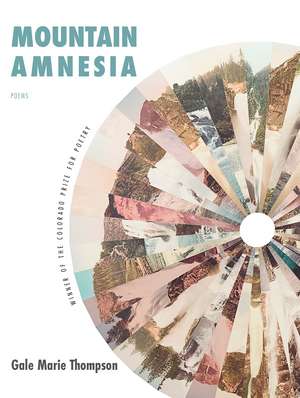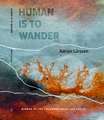Mountain Amnesia: Colorado Prize for Poetry
Autor Gale Marie Thompsonen Limba Engleză Paperback – dec 2023 – vârsta ani
Mountain Amnesia also explores the question of how implicated or dependent we are on the lives and actions of others. What does it mean to be accountable to and responsible for those around you? How are we implicated in others’ crimes? What can we do in the aftermath? The poems in this collection explore the limits of knowing and seeing, and how we come to be known and seen: “I ask the world for its bandage /of meaning.” Mountain Amnesia both pursues and surrenders to these limits of knowing, narrowing the vast distances between ourselves and others.
Preț: 86.81 lei
Nou
Puncte Express: 130
Preț estimativ în valută:
16.62€ • 18.06$ • 13.97£
16.62€ • 18.06$ • 13.97£
Carte indisponibilă temporar
Doresc să fiu notificat când acest titlu va fi disponibil:
Se trimite...
Preluare comenzi: 021 569.72.76
Specificații
ISBN-13: 9781885635877
ISBN-10: 1885635877
Pagini: 90
Dimensiuni: 165 x 216 x 10 mm
Greutate: 0.14 kg
Editura: Center for Literary Publishing
Colecția Center for Literary Publishing
Seria Colorado Prize for Poetry
ISBN-10: 1885635877
Pagini: 90
Dimensiuni: 165 x 216 x 10 mm
Greutate: 0.14 kg
Editura: Center for Literary Publishing
Colecția Center for Literary Publishing
Seria Colorado Prize for Poetry
Recenzii
“Mountain Amnesia stretches thin the fibrous tissues of grief that inhabit the body, mind, and ether of existence from burrowing traumas. These lamentations expose the weight of abuse, longing and loss, unanswered prayers, and an inescapable natural law: ‘this I know: that even evil men die.’ Here is a poetics of cobbling the self together in the wake of ruin and disorder through list making, the yearning for a caroling inside flesh, writing to quiet the imprints of violence, thinking about sharkskin and the waving of Saturn’s rings, a tethering to the more-than-human world, and a struggle to not reach toward the dirt before it is time. Whether counting incisions or counting the dead, these poems seek a way through the doubt and destruction into connectivity by understanding that ‘we are mostly lonely when we change.’ The poems intertwine in our animality, our closeness to the animals who bring words like “mercy” into the field, animals that hide ‘in an under-the-porch way, still marked / with the blueprint of a predator,’ the fox as a wobbling red star, the folded fawn, the whale returning home after months to finish a song, the dead squirrel, and the voles who emerge in the yard with new myth. These are worlds of new mythmaking, a desire for self-love beginning in the very spine of the body: ‘A loved posture can also be a speech act. / This is how it begins. What will seep will seep.’ A gorgeous seeping occurs in these poems where the voice fights to not disappear, to keep touching the world. Mountain Amnesia is a heart-wrenching account of how the body remembers, becomes a feral archive, and sifts through the wildness: ‘For anything to emerge / from crisis, crisis must show its face. / But crisis is only the beginning.’ In carrying our wounds, we discover that ‘there is no one on the other side’ of the mountains that we abandon or the mountains we live in the shadows of, except the self in waiting—to lull us back to our corporeal dwelling, to ‘sing in its ragged globe,’ to find a devotion of healing.”
—Felicia Zamora, final judge, author of I Always Carry My Bones
“The poems of Gale Marie Thompson’s Mountain Amnesia enact an endangered interiority. Their vulnerability runs deep, and the stakes are life and death, but there is no easy spectacle in it. A devastating act of violation lives at the book’s core, and that violence echoes outward, in ‘the gully’s mouth / torn open / like a birthday streamer’; in the earth, which ‘betrays / as it scrapes away / like some black treadmill’; in ‘the Bell mountain peak mined gaping / and useless.’ A mountain landscape provides the book’s image palette, but this is no idealized pastoral. ‘There are tufts of beauty on the earth,’ she writes, ‘but the earth is ugly, and will not last.’ The speaker is a supplicant, in part. ‘Mercy—healing— / these are words I’ve never used in a poem before,’ but the poems complicate mercy and healing, crisis and trauma, at every turn. They excise crisis from the shadows, and in doing so, claim a ‘feral telling,’ not a trauma narrative per se, but ‘the story of the moment / right before the word crisis—of the green brink,’ a consecrated place. Thompson earns it for herself by using language as a tool to challenge amnesia, to name cruelty and to claim it, to ask for mercy and to offer it, to ‘break some spell / parallel to what / he took.’ It is this lyrical moment in which the poet encompasses god and claims a resiliency as primal as rain. Gale Marie Thompson has crafted nothing less than a sacred text.”
—Diane Seuss, author of frank: sonnets
—Felicia Zamora, final judge, author of I Always Carry My Bones
“The poems of Gale Marie Thompson’s Mountain Amnesia enact an endangered interiority. Their vulnerability runs deep, and the stakes are life and death, but there is no easy spectacle in it. A devastating act of violation lives at the book’s core, and that violence echoes outward, in ‘the gully’s mouth / torn open / like a birthday streamer’; in the earth, which ‘betrays / as it scrapes away / like some black treadmill’; in ‘the Bell mountain peak mined gaping / and useless.’ A mountain landscape provides the book’s image palette, but this is no idealized pastoral. ‘There are tufts of beauty on the earth,’ she writes, ‘but the earth is ugly, and will not last.’ The speaker is a supplicant, in part. ‘Mercy—healing— / these are words I’ve never used in a poem before,’ but the poems complicate mercy and healing, crisis and trauma, at every turn. They excise crisis from the shadows, and in doing so, claim a ‘feral telling,’ not a trauma narrative per se, but ‘the story of the moment / right before the word crisis—of the green brink,’ a consecrated place. Thompson earns it for herself by using language as a tool to challenge amnesia, to name cruelty and to claim it, to ask for mercy and to offer it, to ‘break some spell / parallel to what / he took.’ It is this lyrical moment in which the poet encompasses god and claims a resiliency as primal as rain. Gale Marie Thompson has crafted nothing less than a sacred text.”
—Diane Seuss, author of frank: sonnets
Notă biografică
Gale Marie Thompson is the author of Helen or My Hunger (YesYes Books, 2020) and Soldier On (Tupelo Press, 2015). Her poetry and prose have appeared in American Poetry Review, Bennington Review, and Mississippi Review, among others. A winner of the Poetry Society of America's 2022 Emily Dickinson Award, Thompson has received fellowships from the Vermont Studio Center and Kimmel Harding Nelson Center for the Arts. She is founding editor of Jellyfish Poetry and currently works as an editor in book development for YesYes Books. Gale lives in the mountains of North Georgia, where she directs the creative writing program at Young Harris College.





